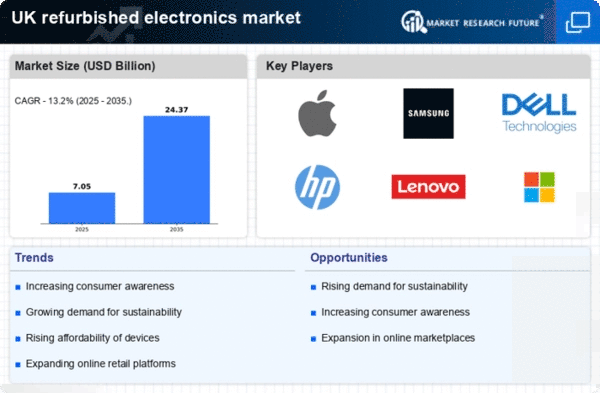Growing Environmental Awareness
The increasing environmental consciousness among consumers in the UK appears to be a pivotal driver for the refurbished electronics market. As individuals become more aware of the ecological impact of electronic waste, they are likely to seek sustainable alternatives. This shift in consumer behavior suggests a growing preference for refurbished products, which are perceived as environmentally friendly. According to recent data, the UK has seen a rise in the recycling rate of electronic devices, reaching approximately 45% in 2025. This trend indicates that consumers are not only interested in purchasing refurbished electronics but are also actively participating in the recycling process, thereby supporting the refurbished electronics market. The industry's alignment with sustainability goals may further enhance its appeal, potentially leading to increased market penetration and consumer loyalty.
Economic Factors and Consumer Spending
Economic conditions in the UK significantly influence consumer spending habits, which in turn impacts the refurbished electronics market. With the cost of living rising, many consumers are becoming more budget-conscious, leading to a heightened interest in cost-effective alternatives. Refurbished electronics often provide a more affordable option compared to new devices, making them attractive to a broader audience. Recent statistics indicate that the refurbished electronics market has experienced a growth rate of approximately 15% in 2025, driven by this economic shift. As consumers prioritize value for money, the demand for refurbished products is likely to continue to rise, suggesting a robust future for the industry. This economic landscape may encourage manufacturers and retailers to expand their offerings in the refurbished sector, further stimulating market growth.
Rising Demand for Affordable Technology
The demand for affordable technology solutions in the UK is a significant driver for the refurbished electronics market. As consumers seek to balance their technological needs with budget constraints, refurbished products offer a compelling solution. The market has seen a notable increase in interest, with approximately 30% of consumers in 2025 indicating a preference for refurbished electronics over new devices. This trend suggests that the industry is well-positioned to cater to a diverse consumer base, including students and budget-conscious families. The affordability of refurbished electronics not only meets consumer needs but also encourages a more sustainable approach to technology consumption. As the market continues to evolve, it is likely that retailers will expand their offerings, further enhancing the appeal of refurbished products and solidifying their place in the technology landscape.
Technological Advancements in Refurbishment
Technological advancements in refurbishment processes are playing a crucial role in enhancing the quality and reliability of refurbished electronics. Innovations in testing, grading, and repair techniques have improved the overall performance of refurbished products, making them more appealing to consumers. The refurbished electronics market benefits from these advancements, as they help to establish trust and credibility among potential buyers. In 2025, it is estimated that around 70% of consumers in the UK are willing to consider refurbished electronics, largely due to improved quality assurance measures. This trend indicates that as technology continues to evolve, the industry may experience increased demand, as consumers become more confident in the reliability of refurbished products. Consequently, this could lead to a more competitive market landscape, with a wider array of high-quality refurbished options available.
Regulatory Support for Sustainable Practices
Regulatory frameworks in the UK are increasingly supporting sustainable practices, which may positively impact the refurbished electronics market. Government initiatives aimed at reducing electronic waste and promoting recycling are likely to create a more favorable environment for refurbished products. For instance, the UK government has set ambitious targets to reduce waste and increase recycling rates, which could encourage consumers to opt for refurbished electronics as a viable alternative. In 2025, it is projected that regulatory incentives may lead to a 20% increase in the adoption of refurbished products among consumers. This regulatory support not only fosters a culture of sustainability but also positions the refurbished electronics market as a key player in the broader effort to combat electronic waste, potentially driving further growth in the industry.















